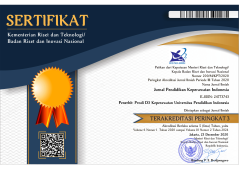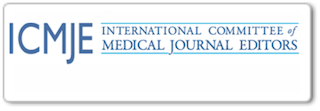Factors Related to Psychological Help-Seeking Behavior among First-Year College Student
Abstract
Psychological Help-Seeking Behavior is an action taken in seeking psychological help from others to solve the problem at hand. This study aims to determine factors related to psychological help-seeking behavior among first-year college students. This study is a descriptive-correlation study with an approach cross-sectional. The sample was taken using proportionate stratified random sampling, with 144 participants based on the G-Power calculation. The instruments used are General Help-Seeking Questionnaire (GHSQ) and Actual Help Seeking Questionnaire (AHSQ), data analysis using univariate and bivariate (chi-square). In this research, there is a relationship between age factor and gender factor with psychological help-seeking behavior with a p-value (< 0.05). Most of the first-year students perform psychological help-seeking behavior in the future and currently, while other factors in this research did not have a significant relationship both in the future, past and present. This can happen due to the unbalanced number of sample proportions.
Keywords
References
Ebert, D. D., Mortier, P., Kaehlke, F., Bruffaerts, R., Baumeister, H., Auerbach, R. P., Alonso, J., Vilagut, G., Martínez, K. U., Lochner, C., Cuijpers, P., Kuechler, A. M., Green, J., Hasking, P., Lapsley, C., Sampson, N. A., & Kessler, R. C. (2019). Barriers of mental health treatment utilization among first-year college students: First cross-national results from the WHO World Mental Health International College Student Initiative. International Journal of Methods in Psychiatric Research, 28(2), 1–14.
Handayani, T., Ayubi, D., & Anshari, D. (2020). Literasi Kesehatan Mental Orang Dewasa dan Penggunaan Pelayanan Kesehatan Mental. Indonesian Journal of Health Promotion and Behavior, 2(1), 9-17.
Heerde, J. A., & Hemphill, S. A. (2018). Examination of associations between informal help-seeking behavior, social support, and adolescent psychosocial outcomes: A meta-analysis. Developmental Review, 47, 44-62.
Manumba, R., & Hamid, A. Y. (2020). Faktor-Faktor yang Berhubungan Dengan Pencarian bantuan Pada Orang Dengan Gangguan Jiwa. Jurnal Ilmu Keperawatan Jiwa, 3(4), 391-402.
Prasetio, C. E., Rahman, T. A., & Triwahyuni, A. (2019). Gangguan Mental Emosional dan Kesepian pada Mahasiswa Baru. MEDIAPSI. 5(2), 97–107.
Ramadan, A. A., & Mohamed, N. A. (2019). Prevalence and Correlates of Deliberate Self – Harming Behaviors among Nursing Students. IOSR Journal of Nursing and Health Science, 8(2), 52–61.
Rickwood, D., Deane, F. P., Wilson, C. J., & Ciarrochi, J. V. (2005). Young people ’ s help-seeking for mental health problems. Australian e-Journal for the Advancement of Mental Health, 4, 1–34.
Ross, S.E., Niebling, B,C., Heckert, T. . (2008). Sources of stress among college students. College Student Journal, 33(2), 312-317.
Salim, S. (2010). Psychological help seeking attitudes among Malaysian College and university students. Elsevier. 5, 426–430.
Shi, W., & Hall, B. J. (2020). Help-seeking preferences among Chinese college students exposed to a natural disaster: a person-centered approach. European Journal of Psychotraumatology, 11(1), 1-12.
Thompson, L.K., Sugg, M.M., & Runkle, J.R. (2018). Adolescents in crisis: A geographic exploration of help-seeking behavior using data from Crisis Text Line. Social Science & Medicine, 215, 69-79.
Upadhyaya, S. K., Raval, C. M., & Sharma, D. K. (2018). The sociocultural factors and patterns of help seeking among patients with mental illness in the sub Himalayan region. Industrial Psychiatry Journal, 27, 279–284.
Vidourek, R. A., King, K. A., Nabors, L. A., & Merianos, A. L. (2014). Students’ benefits and barriers to mental health help-seeking. Health Psychology and Behavioral Medicine, 2(1), 1009–1022.
Wimer, D.J., & Levant, R. F. (2011). The Relationship of Masculinity and help-seeking style with the academic help-seeking behavior of college men. The Journal of Men’s Studies 19(3), 256-274.
Yin, H., Wardenaar, K. J., Xu, G., Tian, H., & Schoevers, R. A. (2019). Help-seeking behaviors among Chinese people with mental disorders: A cross-sectional study. BMC Psychiatry, 19(1), 1–12.
DOI: https://doi.org/10.17509/jpki.v7i2.40102
Refbacks
- There are currently no refbacks.
Jurnal Pendidikan Keperawatan Indonesia(JPKI) published by Indonesia University of Education. JPKI is licensed under a Creative Commons Attribution-ShareAlike 4.0 International License.
Office :
Nursing Department. FPOK UPI.
229, Dr. Setiabudhi Street. Bandung 40154
West Java , Indonesia
E-mail : jpki@upi.edu

_.png)
_.png)
_.png)











